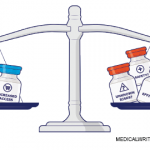
Panchenko Vladimir / shutterstock.com
AMSTERDAM—As more biosimilar drugs for rheumatic diseases make their way to market, evidence is growing that switching from the originator drug to a biosimilar tends to be effective, while the questions of switching back and forth, and switching multiple times using several different biosimilars, remain to be answered, an expert on the topic said at the EULAR: Annual European Congress of Rheumatology.
How patients respond to being switched to biosimilars—which are based on the formulations of the originally approved medications but are expected to be less expensive—is of growing interest to the rheumatology community. A biosimilar to the anti-TNF infliximab (Remicade)—known in the U.S. as infliximab-dyyb (Inflectra)—is now on the U.S. market. And other biosimilars have been approved.
Some biosimilars to the TNF-blocker adalimumab (Humira), considered the world’s best-selling drug, are expected to become available in Europe in October 2018. But the release of the biosimilars in the U.S. has been delayed until 2023 following patent lawsuits and dealmaking between adalimumab manufacturer AbbVie and the manufacturers of the two biosimilars, Amgen and Samsung.
The Evidence
Some of the evidence on switching from infliximab to its biosimilar comes from extension phases of phase 3 randomized, controlled trials, said Tore K. Kvien, MD, professor of rheumatology at the University of Oslo, Norway, and head of the Department of Rheumatology at Diakonhjemmet Hospital. One of them, PLANETAS, involved infliximab and its biosimilar, CT-P13, in ankylosing spondylitis patients.1 Another, PLANETRA, involved the same drugs in rheumatoid arthritis (RA) patients.2
“These extension trials have generally confirmed that switching is not a major concern,” Dr. Kvien said. But he emphasized that the patients enrolled tended to be biologic-naive and were randomized to receive the originator drug before the switch—so they were not patients who had been on a biologic drug for a long period of time.
DANBIO, a study that assessed results after a 2016 mandated nationwide switch in Denmark from infliximab to CT-P13, found no significant differences among disease activity measures for RA, psoriatic arthritis (PsA) or axial spondyloarthritis (SpA) patients.3
The premier study assessing switches to the infliximab biosimilar is NOR-SWITCH, which enrolled 482 patients to assess whether CT-P13 was non-inferior to the originator infliximab in disease worsening among those who were stable on infliximab treatment for at least six months. All six infliximab indications were assessed—Crohn’s disease, ulcerative colitis, SpA, RA, PsA and psoriasis.4
Researchers found no significant differences between those who had switched and those who remained on infliximab in disease worsening, remission, global assessment of disease activity, drug trough levels or anti-drug antibodies, so the biosimilar was found to be non-inferior. In an extension phase, patients who were switched from originator infliximab to CT-P13 at the start of the extension phase actually had lower levels of disease worsening than those who maintained treatment with CT-P13 throughout the extension period.


